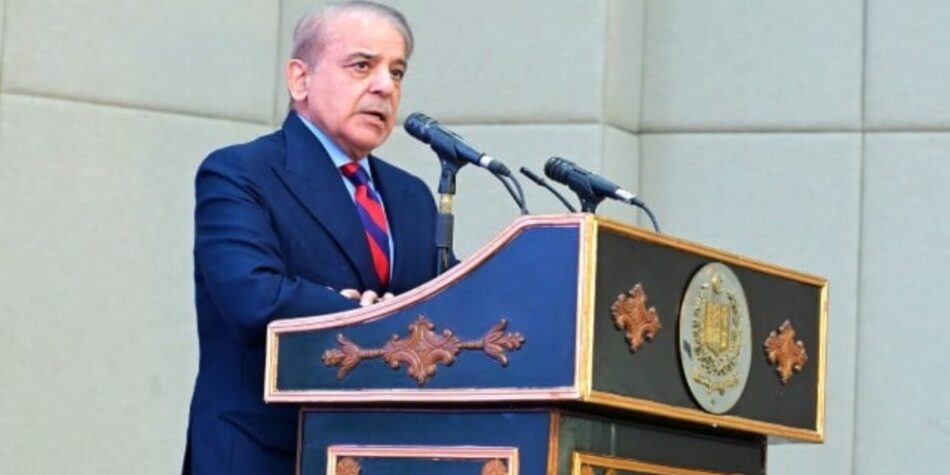Prime Minister Shehbaz Sharif announced an “education emergency” nationwide in Pakistan aimed at enrolling approximately 26 million out-of-school children and enhancing literacy rates to position the country as a highly educated society globally.
In his address at the National Conference on Education Emergency, the prime minister emphasized the urgent need to address the issue of millions of children not attending school. He declared the education emergency effective immediately, with plans to implement strategies similar to those successfully used in Punjab across the entire country.
Prime Minister Sharif emphasized his commitment to this initiative, expressing his intention to collaborate with all provincial leaders, regardless of political affiliations, to ensure its success. He called upon the provinces to join hands in this crucial effort.
Acknowledging the enormity of the challenge, he drew inspiration from other nations like Germany and Japan that have overcome adversity, expressing confidence that Pakistan can similarly rise to the occasion. He assured the audience that with unity and concerted efforts, Pakistan could become one of the most educated societies globally.
The prime minister highlighted the achievements of the Punjab government during his tenure as chief minister, noting increased enrollment rates, particularly for girls, through programs like the Zevar Taleem Programme. He emphasized the rescue of 90,000 boys from brick kilns for school enrollment.

Additionally, he mentioned outsourcing 10,000 underperforming schools to enhance educational quality and the establishment of Daanish Schools, providing free high-quality education and boarding for disadvantaged children. The Punjab Education Endowment Fund was noted for granting scholarships to deserving students based on merit.
Addressing the challenges of enrolling 26 million out-of-school children and tackling stunted growth, the prime minister emphasized the need for significant financial resources and, more importantly, the determination to act. He drew parallels to past challenges, recalling Pakistan’s commitment to becoming a nuclear power despite international pressure and the sacrifices made to eradicate terrorism, contributing to establishing peace nationally and globally.
In his speech, Minister for Federal Education and Professional Training Dr Khalid Maqbool Siddiqui emphasized the urgent need for action in Pakistan’s education sector, highlighting the critical nature of the situation with no room for failure. He expressed deep concern over education statistics in the country, noting that more than 26 million children are out of school, a number exceeding the population of 150 countries globally.
Abdullah A. Fadil, the UNICEF representative in Pakistan, underscored that over 70 percent of 10-year-old children in Pakistan struggle to read or understand text. He pointed out that despite constitutional guarantees, education in Pakistan is neither compulsory nor free.
Fadil emphasized that by investing more in education and young people, Pakistan could restore its previous standing. He highlighted Pakistan’s achievement of producing the first Nobel Laureate in Physics and its recent launch of a moon mission.
British High Commissioner in Islamabad Jane Marriott noted that with 60 percent of the population under 30 years of age, Pakistan is at a critical juncture facing crucial decisions. She emphasized urgent measures such as increased funding, inclusivity, multiple school shifts, and improving student retention. Marriott assured full cooperation from her country in achieving these goals.
In a video message, World Food Programme Country Director Coco Ushiyama stressed the interconnectedness of food security and education, highlighting school meals as a vital investment in Pakistan’s future.
World Bank Vice President Martin Raiser highlighted Pakistan’s challenge with 40 percent of children experiencing stunted growth, rising to around 60 percent in poor districts. He commended the prime minister for tackling the issue of out-of-school children and recommended holding absent teachers accountable, along with providing essential infrastructure like public transport, safe roads, toilets, and electricity in schools to boost enrollment. Raiser emphasized the importance of investing in climate resilience given the vulnerability of Pakistan’s education system to climate change.
Naila Kiani, Pakistan’s fastest mountaineer, spoke from Makalu Mountain in a video message, attributing her success to self-belief and education. She urged the prime minister and chief ministers to allocate more resources for girls’ education to empower them to achieve their dreams.






